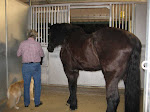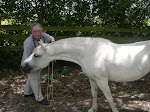The Encarta Dictionary offers some of the following definitions of what a leader is;
1. Someone people follow
2. Someone in the lead
3. Someone in charge
I’ll add the definition most of us pick up in our first years in school
4. First in line
Notice that the idea a leader should be trustworthy is not included. Yet that is the very foundation of being a leader of a herd of horses or pack of dogs. It is also critical to cows and goats. I do not include other animals because I have not had a chance to observe group interactions as I have with these animals.
A common mistake a lot of people make is that control and leading are the same things. They are not. Most of us want control of our immediate environment, but we don’t want to be the one responsible for everybody else. This is okay. Too many leaders can lead to chaos as anyone who has dealt with two alphas (i.e. leader types) in a group of animals can attest. Something many don’t realize is that among horses two omegas can cause just as much chaos. I’ll do a blog on that later.
I was raised as an only child among older adults. I saw my cousins a couple of times a year and occasionally played with a little girl that lived several blocks away from me. I had no skills in dealing with groups of other children when I went to school.
We started in first grade back in those days. I was a leading baby boomer so the class was large—about thirty children. Further more I was the only one who spoke English for the first couple of months. Everyone else in class spoke Spanish. They also had lovely, straight, black hair, large brown eyes and beautiful tanned skin that didn’t burn to a bright red when they stayed out in the sun for fifteen minutes. I had curly light brown hair, green eyes and the pale hide that burned.
I was raised by people who were accustomed to dealing with animals. The closest thing I had to a sibling was my mother’s stud dog, a Pekingese with the kennel name of Pug, and a cat of my grandmother’s. My grandmother had been a horse trainer in her youth (someone had to teach horses to wear sidesaddles and not spook at skirts) and kept a few chickens even in the heart of San Antonio, Texas, which is where I grew up. Animals I knew. My perception of people was they were big and wanted me to stay out of their way.
My first grade teacher decided I was going to be a “leader” because I already spoke English. I wanted to learn Spanish so I could talk to the other kids. Because of this we all got in trouble. The other kids decided I was not a good leader because they got a lecture on the main rule, which at the time was, “Spanish is not allowed at any time during school.”
What they didn’t know was I got taken to the principal’s office and my grandmother (my primary caregiver) called in to deal with my disobedience. Because I spoke English I was some how supposed to know better than to break the RULE!
The next thing that happened was later in the year when I won a spelling contest. By then there were several other children in the class who were not Mexican American. One was Chinese American and the other three were like me, northern European and/or British mutts.
Just in case you haven’t figured it out I know very well what it is to be a minority. It wasn’t fun.
Back to the spelling bee. I won it and got a mechanical rabbit for my prize. When I got back to my table the girl who was my best friend declared, “I hate you. I wanted that rabbit and I’m never going to speak to you again.”
Forever was ten minutes, but I never won another contest. In fact, I decided third place was a good safe place to be. No one gets too upset if you place third. Any first place prizes I acquired after that were by sheer accident.
That was also when I decided being a leader meant having a big bull’s
eye painted on your back.
It was twenty years before I connected that what I was doing with animals was leadership and that I could use the same techniques with humans.
Being the leader does not just mean being first. It can mean being the one who knows which direction to take. Call it being the navigator if leader is an uncomfortable title. The leader/navigator of a herd or pack is the one that knows where food, water and safety is. They know where they are supposed to go and what to do when they get there. The one that knows these things will be the real leader even if they are in the middle of the herd.
When watching a herd of horse the way to determine the lead mare is not by who is first in from pasture, but which horse all the others turn to when something out-of-the-ordinary happens. That is the true leader of the herd. The true lead male (who can be a gelding) is the one that gets between the herd and danger.
So, being the leader to you horse or dog means; knowing how to meet the needs of your animal, keeping it out of trouble and protecting it when danger threatens. It isn’t about being the one who yells the loudest or beats up on others. It is about knowledge and protection. It is also an excellent way to take care of your family.
Once I realized those points I sometimes did allow myself to be the leader of a group of humans as well as an animal leader. Sometimes a group needs someone to pick a direction and when someone does that person tends to end up leading the group.
There are a lot of bad leaders in our world. They are all about being first and doing things for themselves. We don’t need that kind of leader any more than a herd of horses or a pack of dogs does. We need superior navigators who will guide the group and protect it.
This is what we need to be to our animals. We take them into our lives and unnatural circumstances therefore it is up to us to teach them the rules and guide them to the safe places in our world.
Subscribe to:
Post Comments (Atom)










No comments:
Post a Comment